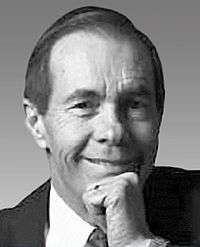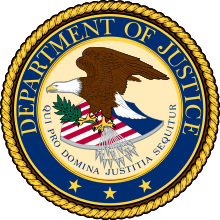Rex E. Lee
| Rex E. Lee | |
|---|---|
 | |
| 10th President of Brigham Young University | |
|
In office 1989–1995 | |
| Preceded by | Jeffrey R. Holland |
| Succeeded by | Merrill J. Bateman |
| 37th Solicitor General of the United States | |
|
In office August 1981 – October 1985 | |
| President | Ronald Reagan |
| Preceded by | Wade H. McCree |
| Succeeded by | Charles Fried |
| 1st Dean of the J. Reuben Clark Law School | |
|
In office 1971–1981 | |
| Preceded by | Founding Dean |
| Succeeded by | Carl S. Hawkins |
| Personal details | |
| Born |
Rex Edwin Lee February 27, 1935 St. Johns, Arizona, U.S. |
| Died | March 11, 1996 (aged 61) |
| Religion | The Church of Jesus Christ of Latter-day Saints |
Rex Edwin Lee (February 27, 1935 – March 11, 1996) was an American lawyer, law clerk for former U.S. Supreme Court Justice Byron White, and the United States Solicitor General during the Reagan administration. He argued 59 cases before the U.S. Supreme Court. A member of The Church of Jesus Christ of Latter-day Saints (LDS Church), Lee was an alumnus and the tenth president of Brigham Young University (BYU). Lee was a first cousin of Mo Udall and Stewart Udall.
Early life and education
Lee was born in St. Johns, Arizona, the son of Mabel (née Whiting) and Rex E. Lee.[1] He served a mission for the LDS Church in the Mexican Mission. He first met his future wife, Janet Griffin (whose father was the Treasury Attaché of the US Embassy in Mexico City), while he was in Mexico. When Lee returned from his mission and enrolled at BYU, he again became acquainted with Janet and they got married the following year.[2]
During his undergraduate years at BYU, Lee was elected student-body president.[3] After completing his undergraduate work at BYU, he obtained a J.D. and graduated first in his class from the University of Chicago Law School in 1963.[4] From law school he went to Washington, DC, to serve as a law clerk for Byron White, an Associate Justice of the U.S. Supreme Court.
Early legal career and academia
Following his clerkship at the U.S. Supreme Court, Lee returned to his home state of Arizona, and became a partner in the Phoenix law firm of Jennings, Strouss & Salmon. Within four years of graduating from law school (and before he had taken a deposition in any lower court civil proceeding) Lee argued his first case before the U.S. Supreme Court.
In 1972, Lee left his public legal career to become the founding dean of BYU's J. Reuben Clark Law School and is considered personally responsible for recruiting many members of its charter class.[5][6]
Supreme Court advocate and scholar
Lee entered public service, first at the invitation of Attorney General Edward H. Levi as an Assistant Attorney General in charge of the Civil Division in the United States Department of Justice from 1975 to 1976,[7] and then as Solicitor General of the United States from 1981 to 1985. As Solicitor General, Lee had the opportunity to focus on the legal effort he enjoyed most: briefing and arguing cases before the U.S. Supreme Court. During his time as Solicitor General, Lee won 23 of the 30 cases he argued during Ronald Reagan's first presidential term.[8] At the time of his death, in a hospital bed, he was preparing to argue his 60th case before the Court.[5]
In addition, Lee built a reputation as a man committed to principle.[8] Associate Justice White said that Lee "was an experienced, careful, and very brainy advocate. And he was the epitome of integrity on whom we could rely for straight talk about the cases coming before the court."[8] At one point, while being criticized for taking somewhat unpopular stances that might have been at odds with the administration under which he served, Lee responded: "I'm the solicitor general, not the pamphleteer general."[4][8]
Lee relished the opportunity to argue before the Supreme Court. His son, Mike, noted that "[b]efore and during the arguments, Rex devoted all his faculties into crafting a persuasive case. But back in his office following the argument, that pent up energy would explode into utter euphoria. Mike likens it to a kid on a sugar high. 'When he came out of there, he was just really excited to talk about it.'"[9] In 1986, after his resignation from the Solicitor General's office, Lee was diagnosed with pancreatic cancer. Justice Sandra Day O'Connor recounted, "I remember an appearance at the court by Rex Lee [near the end of his 1987 hospitalization for cancer treatment]. Looking very pale and weak, he had to sit on a stool for the only time I saw him do that. I think he wore a wig. But nonetheless, [he was] effective. And we were all very moved by that."[8]
Following a year of medical treatment and therapy, Lee recovered and was named BYU's president. According to some accounts, when Lee was asked to assume the position as university president, he accepted on the condition that he would still be able to argue cases before the Supreme Court in his spare time (and did so on nine occasions).[8] Of that time period, former Solicitor General Theodore B. Olson, said, "I'm willing to bet that even as a part-time lawyer, Rex probably had more arguments than any other attorney in private practice in that period."[8] Unfortunately, before his tenure as university president was over, his cancer returned. Lee served at the university from July 1, 1989 to December 31, 1995, leaving the position two and one-half months before he died.
Legacy
During a memoral service for Lee, former Acting Solicitor General Walter Dellinger stated that even after years of separation, Lee's influence was still felt in the Office of the Solicitor General. According to Dellinger, "Some few people have influence that lasts well beyond their time. One is Rex Lee."[5] Lee's influence is still seen today, in both government and academia. Current Supreme Court Justice Samuel Alito served as an assistant to Solicitor General Lee from 1981 to 1985, where Alito argued 12 cases before the Court.[9] Lee's son, Thomas, also graduated from both BYU and the University of Chicago Law School before clerking for Judge Harvie Wilkinson on the United States Court of Appeals for the Fourth Circuit, and then Justice Clarence Thomas on the Supreme Court.[9] Like his father, Tom would later teach at the J. Reuben Clark Law School, before resigning to accept an appointment as an Associate Justice on the Utah Supreme Court.[9] Another son, Mike, graduated from BYU as an undergrad and a law student, before clerking for Judge Dee Benson at the United States District Court, District of Utah, and for Justice Samuel Alito, once while he was still judge on the United States Court of Appeals for the Third Circuit, and once on the U.S. Supreme Court.[9] In 2011, Mike Lee became a United States Senator from Utah.
Lee was an avid runner throughout his life (he was nominated to be Solicitor General two days after completing the Boston Marathon),[4] and an annual race is held in his honor at BYU to raise proceeds for cancer research.[10]
Lee and his wife, Janet, are the parents of seven children. Diane Allred, Thomas Rex, Wendy Jacobsen, Michael Shumway, Stephanie Paulson, Melissa Wimmer & Christie. At the time of death he had 10 grandchildren Ashley, Chelsea & Alexander Allred, Jordan, Jacob & Benjamin Lee, Colton & Madeleine Jacobsen, and James and John Lee.
Works
- Rex E. Lee (1981), A Lawyer Looks at the Constitution; Brigham Young University Press; ISBN 0-8425-1904-1
- Rex E. Lee (1992), What Do Mormons Believe; Deseret Book; ISBN 0-87579-639-7
See also
References
- ↑ "Mike Lee ancestry". Freepages.genealogy.rootsweb.ancestry.com. Retrieved 2014-03-07.
- ↑ Marian Wilkinson Jensen. Women of Commitment: Elect Ladies of Brigham Young University. (Salt Lake City: Horizon Books, 1997) p. 40-43
- ↑ Hill, Greg. Funeral Spealers Laud Life of Rex Lee, Church News, March 23, 1996, retrieved 2012-05-08
- 1 2 3 Binder, David. Rex Lee, Former Solicitor General, Dies at 61, The New York Times, Mar. 13, 1996 retrieved 2012-05-11
- 1 2 3 Wilkins, Richard. In Memoriam: Rex E. Lee, Clark Memorandum, (Spring 1996) p. 4 retrieved 2012-05-11
- ↑ Warning Claxons from Utah: Bob Bennett Voted Out, Millard Fillmore's Bathtub, May 9, 2010 Update retrieved 2012-09-13
- ↑ "52 University of Chicago Law Review 1985 Attorney General Edward H. Levi Comment". Heinonline.org. Retrieved 2014-03-07.
- 1 2 3 4 5 6 7 Davidson, Lee. Supreme Court Justices Pay Tribute to the Late Rex Lee. BYU Magazine, Nov. 1996 retrieved 2012-04-23
- 1 2 3 4 5 Gardner, Peter B. Brothers in Law, BYU Magazine, Spring 2011 retrieved 2012-05-08
- ↑ "Rex Lee Run | Run for a Cure with Brigham Young University's Cancer Awareness Group". Rexleerun.byu.edu. Retrieved 2014-03-07.
External links
- A Concurrent Resolution on the Death of Rex E. Lee from the Arizona State Legislature website
- Supreme Court Justices Pay Tribute to the Late Rex E. Lee from the Brigham Young University website
- Loving Rex Lee, A Personal Remembrance from the Brigham Young University website
- Rex E. Lee Law Society at the University of Virginia
- A Lawyer Looks at Rex Lee, by Dr. James McClellan, which appeared in the March–April 1984 Edition of Benchmark Magazine
| Legal offices | ||
|---|---|---|
| Preceded by Wade H. McCree |
Solicitor General of the United States 1981–1985 |
Succeeded by Charles Fried |
| Academic offices | ||
| Preceded by Jeffrey R. Holland |
President of BYU 1989–1995 |
Succeeded by Merrill J. Bateman |
